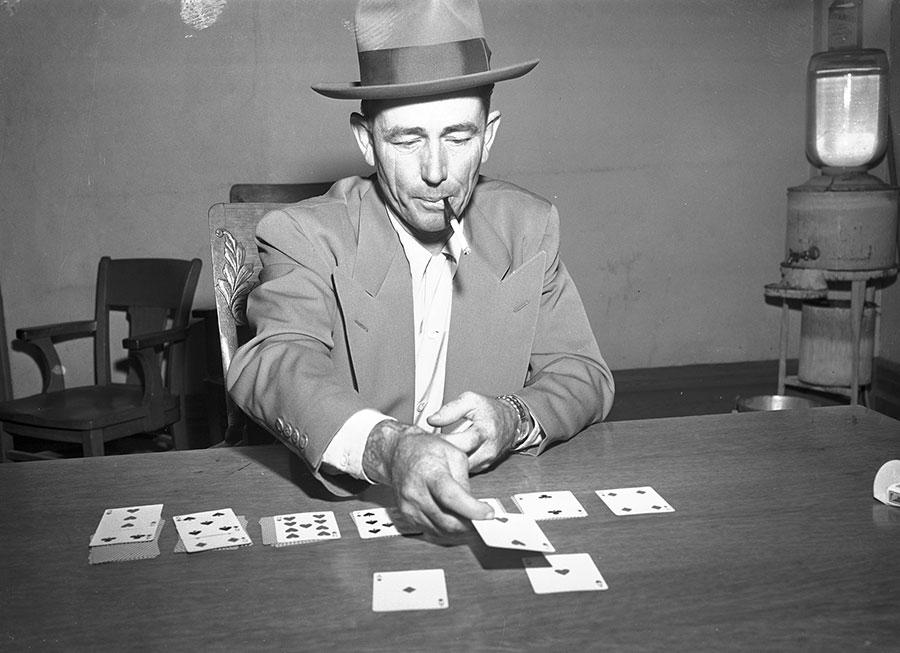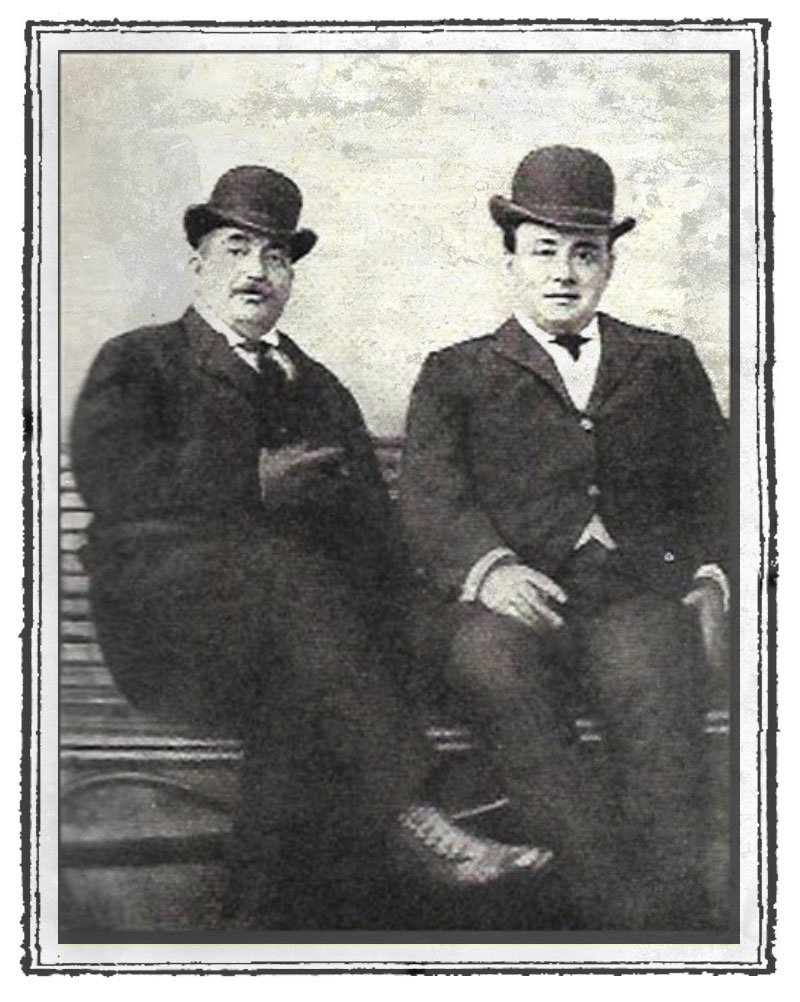The History of Solitaire from a gambler’s perspective is a story that goes back as far as the history of Solitaire itself. In this article, I will guide you through all the different chapters of this fascinating history. Although Solitaire never was really a gambling game, it has been so popular that its popularity was used or misused several times during its existence to lure gamblers into it.

The oldest reference to Gambling with Solitaire
The oldest book I came across with rules of Solitaire mentioned in it, and with a reference to gambling, is the historical German book: Das Neue Königliche l’Hombre from 1788. Many websites and books are referring to this book as the oldest book with a description of a Patience game. What you often don’t read is that this first Patience game was already used for gambling purposes.
“This game is played between 2 people in the way that alternately only 1 person is the player. However, those present collectively participate in the game by betting for or against the player.”
The gambling aspect was an important part of “Das Patiencespiel,” as the game is called in the book. Although it was used for gambling purposes, there is no reference to a casino or gambling house where this game might have been offered.
Solitaire Played in a Casino
In the old days, was Solitaire ever played in a real casino with real cards and dealers? If so, did the gambling houses have issues with cheating?
Thinking about a game of Solitaire, or “Solitary” as it used to be called, invokes images of solitude and quiet time. The onus is upon oneself to play it ‘straight’ – to not win by cheating, but rather, by beating the odds with skill and a bit of good luck. You could win without cheating, or maybe not…that’s why it’s a ‘gamble’ right?
But back in the mid-to-late 1800s, lawlessness ran through the gambling houses like the mud-track roads of newly-forming cities. We know they bet on anything and everything. Was Solitaire part of that deal or not? Dare you cheat in this environment? Where would you go hide after you won a round, anyway? Perhaps by location alone, the miner-gamblers were self-regulating, card-playing rip-roaring “good time Charlie types” who knew better than to hustle a hustler.
At the same time, back East, classy Canfield’s Casino in Saratoga Springs, NY, is cited for cheating by both an ex-employee and a reporter. Would the “Prince of Gamblers,” who once said, “I don’t need to cheat to win,” have resorted to cheating at Solitaire?
Solitaire as a casino game has a checkered past worth exploring. How did they play it back then? Was it possible to cheat? Read the article about Solitaire in casinos and gambling houses throughout history, and why it was dangerous to play there.
Klondike Solitaire as a Casino Game
All too often, history is lost in the details. For example, lots of people think the Klondike Gold Rush was in Alaska, but it wasn’t: it was in the Yukon region of Canada. And it was cold. Even in the summertime, permafrost inhibited a strong man with a pickaxe digging for gold. Work was hard and the men were heartier. While only a handful ever became millionaires, thousands enjoyed newfound prosperity…then “pissed it away at the gambling houses every night” penned gold rush reporter, Tappan Adney. They thought gold would last forever, and gambled on anything they could conjure up.
Several card game rules authors have laid claim to the game of Solitaire ‘evolving’ into a betting game during those long winter nights. But is that the real reason why there is a game called “Klondike”? Did these ‘sourdoughs’ really create a brand new version of Solitaire and then make it a betting game, too? How did the “lower 48” (states) know about it and why was it mentioned in books more often than any other form of Solitaire?
The Most Famous Solitaire Gambler in History
Just as flamboyant Don King’s name became synonymous with boxing, Richard Albert Canfield’s name became famous for gambling. Not that he was a gambler tossing dice down the craps table…no, no, not at all. He was a smart man who recognized odds favored the “house” and took a gamble on winning large as a result.
Operating in an era of regulations aimed to shut down all forms of gambling, enduring raids and paying enormous legal fees, this diminutive man dominated the gambling industry. Famously, he said, “I don’t need to cheat to win.” However, he needed to remain open to stay rich. His battles with the law included suing for two IOUs from elite clients. Sure, they owed him the money, but no judge would uphold the ruling at a time when gambling was highly illegal.

Yes, Canfield was a small man with big dreams that came true – and only a few nightmares are thrown in for good measure. He raised the bar on world-class service, high stake tables, and defiant behavior. Retiring with twelve million dollars, one could say all his hard work paid off.
So who exactly was Richard Canfield, the Prince of Gamblers? Why did he become so successful and famous as a gambler? More importantly, why is there a Solitaire named after him?
Did he actually have anything at all to do with (Canfield) Solitaire? Deep research into answering this one question has pulled up some shocking news, views, and theories.
Which of the two Solitaires, Klondike or Gambling House Solitaire, was played in Canfield’s Casino?
Assuming Solitaire of any kind was played in one of Canfield’s gambling houses, the definitive answer depends upon which source you read and which of Canfield’s locations they are referring to. What is interesting to note in this question is the use of “Gambling House Solitaire.” This version of Solitaire varies from Klondike in that only four Foundation piles are laid out. Also, there is a separate pile called the Reserve from which you draw cards in addition to the Stock in hand. If this description sounds familiar it is because this version later became known as “The Canfield.”
Prior to his ownership of the Saratoga Club House, a reporter visited then-owner, John Morrissey, to do a summertime write-up on the popular hot springs resort. Although Solitaire was mentioned in the newspaper story, it was never made clear if that was “Patience,” “Klondike” or “Gambling House Solitaire.” We also don’t know if Canfield kept that game. One author asserted “Fascination” as the game played at Canfield’s in Saratoga Springs, while another claimed, “Seven Card Klondike” at a totally different casino. So what do you think? Check out this article for more information…it might surprise you: What Solitaire was played at Canfield’s Casino?
So where is the name Vegas Solitaire come from and was it ever played in Casinos in Vegas?
Thanks to Microsoft’s installation of Klondike Solitaire on every computer since Windows 3.0, the game has come into question if only for the name, “Vegas Solitaire.” Does it imply the game was once hosted in Las Vegas or is it just a name because “Las Vegas” is synonymous with gambling?
This frequently-asked question, ‘Was Solitaire ever played in Las Vegas casinos?’ was exactly how, and why, all my research began. I never expected to find so many varying opinions, gaps of evidence, and fanciful claims about Solitaire in general, but when it came to Vegas Solitaire, the answer comes from eyewitnesses.
We have a theory about how the game may have been introduced to Las Vegas, but so far no one can actually verify it. Maybe that’s because it involves gangsters.